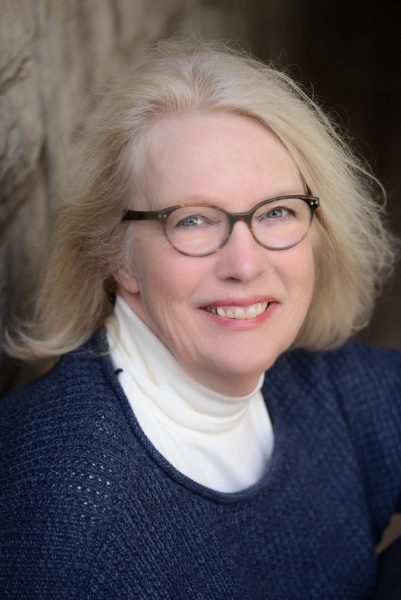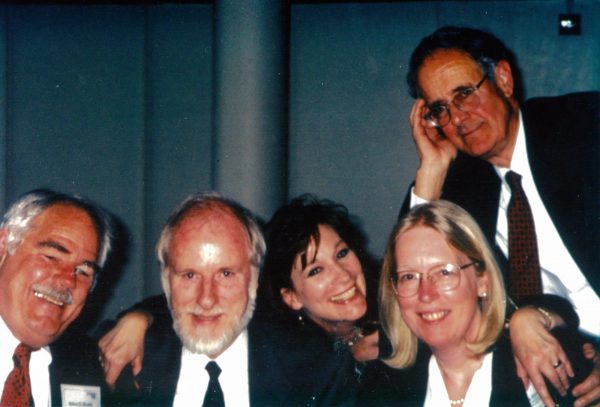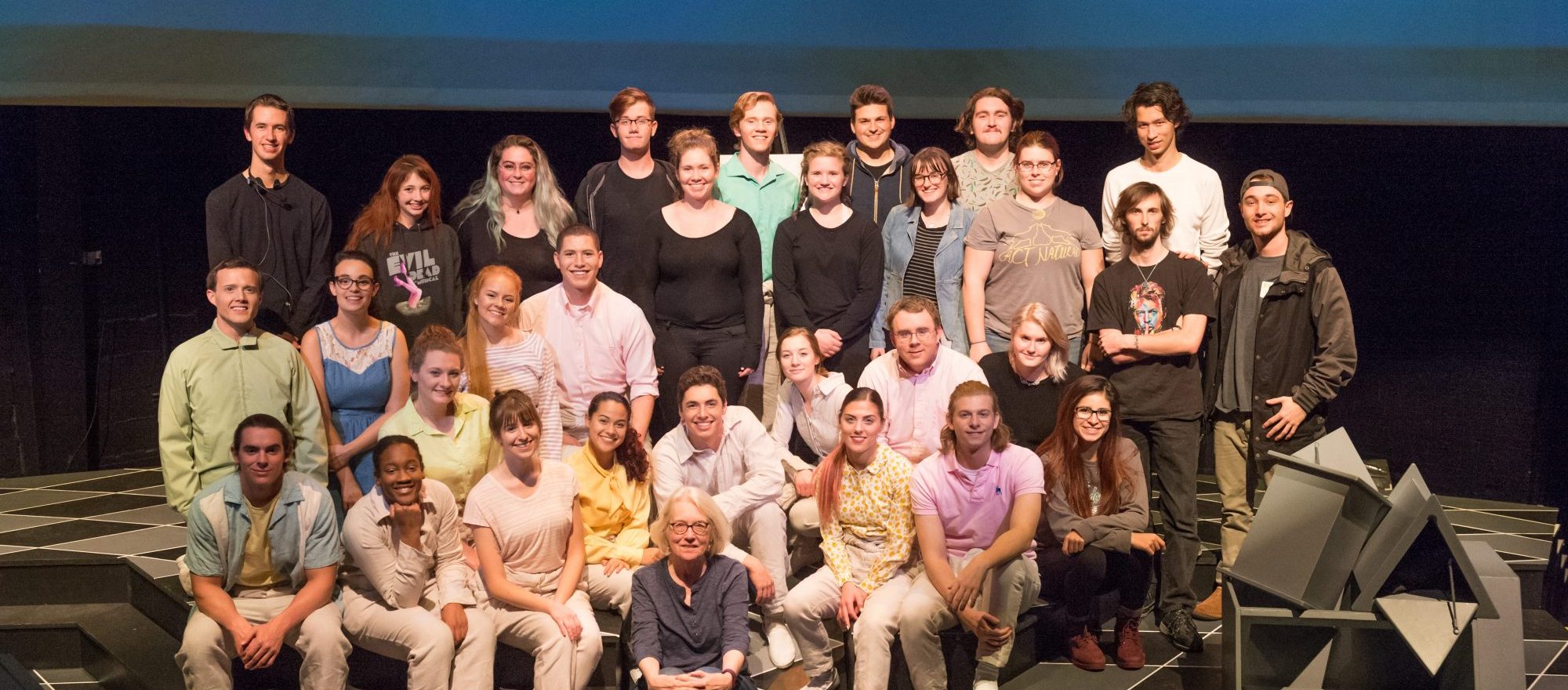When CSU Theatre Professor Laura Jones heard the 2018 Kennedy Center Gold Medallion recipient described as someone who “kept our department alive and well through a seemingly endless uphill battle for [our] beautiful building,” and whose mantra is “theatre is simply a good story well told,” she thought, “well…maybe…?”
But when Nick Taylor, director of theatre at the Community College of Denver, said that the recipient’s husband was in attendance at the Kennedy Center American College Theatre Festival (KCACTF) to present the award, Dr. Jones counted herself out…until she saw George appear from behind a curtain, where he had been hiding, to present her with the national organization’s top award.
“I’m so glad I was genuinely surprised because they all so wanted me to be surprised,” Jones exclaimed. “My husband cannot keep a secret, I swear, and he kept it from me for three weeks!”
It’s a Major Award
Each year, individuals making extraordinary contributions in college theatre are honored by KCACTF. The organization highly regards the recipient’s dedication to educational theatre, as well as contributions of time, artistry, and enthusiasm to the development of the festival, its values, and its goals. The Gold Medallion is the organization’s most prestigious award and considered one of the great national honors in theatre education.
“I feel like I’m bringing home a gold medal from the Olympics after earning 10-point scores in both skill and endurance,” said the self-effacing professor, who is retiring this spring after 24 years of teaching, research and creative activity, outreach, and service at Colorado State University.

A Creative Artist Research Practitioner

The focus of Jones’ responsibilities has shifted during her tenure at CSU, which began in 1993 when the small theatre faculty comprised of Morris Burns, Bob Braddy, and Porter Woods hired her primarily as a generalist. “I’m a Jill of all trades, yes, but I’ve developed specialties because you need to at the university level,” she explained. Through intellectual, academic rigor in creative research, Jones earned her place among Samuel Beckett scholars and practitioners. “What is now accepted and respected in the performing arts is the role of a research practitioner where you meld research with creative artistry,” said Jones. “So, I don’t just write about Beckett’s work, I experiment with it extensively.”
Jones’ foray into the world of Beckett began in 1983 when she was asked to be Alan Schneider’s driver. Schneider, the famous New York director, was spending the summer directing Beckett one-acts for Juilliard’s touring company and teaching directing at the University of Denver, where Jones was a Ph.D. student. “After studying with Alan in July and then seeing three of his Beckett one-acts that played the Denver Center in August, I was able to recognize the man’s signature on his work,” remembers Jones of the director who premiered five of Beckett’s plays in the United States. The conversations impacted Jones’ thesis decision, yet it took the young doctoral student six months to muster the courage to call Schneider and ask if she could write her dissertation on his directing of Beckett. Within weeks, at Schneider’s invitation, Jones saw six more of Schneider’s Beckett one-acts in New York City and was amazed to have become so well connected.
Then, in May of 1984, Schneider, who was directing a new play in London, was posting a letter to Beckett himself when he glanced the wrong direction before crossing a street and was hit by a motorcycle. “He was at the peak of his career when he died, and I was so devastated that I didn’t want to do the thesis anymore. I didn’t want to be a grave picker,” said Jones, whose advisors encouraged her to continue, as no one else would ever have his blessing to do so. Accordingly, Jones interviewed many of those who had worked closest with Schneider, including playwright Edward Albee, critic John Lahr, and actors Jessica Tandy and Hume Cronyn.
Jones’ was particularly excited to continue her research on the Nobel-Prize winning author because English professor emerita Linda Ben Zvi, the first woman president of the International Beckett Society, was still teaching at CSU at the time. With the addition of Eric Prince, faculty member for the Theatre department, CSU’s Center for Studies in Beckett and Performance was formed in 2002, promoting the creation and documentation of the practice and performance of the theatre of Samuel Beckett in a way that challenges the boundaries of contemporary theatre practice.
Jones’ lifetime of experimentation in the field of Beckett studies has included participation in the prestigious Happy-Days Enniskillen International Beckett Festival in Ireland, partnering with Ben Zvi on a Beckett focus group during the centenary celebration of Beckett at Trinity College in Dublin, multiple presentations at International Federation of Theatre Research (IFTR) conferences, and numerous residencies and presentations around the world. In addition, Jones’ sabbatical work resulted in 2008’s The Beckett Project, where Jones, with students from CSU and colleagues at Bas Bleu Theatre Company, conducted creative research trials on the emotive effect of the juxtaposition of light and dark onstage. In the early days of the Beckett Center, Beckett’s only authorized biographer, James Knowlson, gave a public lecture entitled “Beckett and the Old Masters.” Knowlson’s research on the holistic influence of the visual arts on Beckett, who especially loved the Italian masters, prompted Jones’ specific application of Michelangelo Caravaggio’s use of dramatic light to selected Beckett works. Both Knowlson and Ben Zvi returned to campus as The Beckett Project panelists. The collaborations and performance opportunities encouraged by the Center sustain the visibility of Beckett, both as significant art and as living contemporary performance.

Photo credit: Forrest Czarnecki, Rocky Mountain Collegian
If You Build It
In addition to her contributions to the field of theater, Jones’ legacy at CSU certainly includes the University Center for the Arts itself. In a definitive role as chair of the building user group, starting with the usage study of the historic structure and ending with the grand opening of the state-of-the-art complex in 2008, Jones poured 10 years of her life into the beloved center.
Jones proclaims that Dean Bob Hoffert kept the project alive, but describes her job as facilitating consensus among diverse needs and groups, and not just music, theatre, dance, and visual art, which have some common goals, but more so between the users and the administration, facilities, budget, architects, and contractors.
Always Be Yourself
And though her experiences and her impact are varied, Jones’ true passion is teaching, and she’s taught every class in the theatre curriculum that didn’t involve a hammer, a brush, or a needle. “To hell with all of this other stuff! I would be perfectly happy spending all of my time in the classroom and the rehearsal hall,” she declared. Jones considers her collective work as a research practitioner, her time serving on both the building committee and as the director of Theatre, her input into the launch of the Kids Do It All musical-theatre camp, as well as her thoughtful work on the theatre curriculum, as the scaffolding for the student experience. “Those things are the structure for making their experience as positive as possible. The people, space, time, and money are what I juggle, but those aren’t ultimately what is going to advance their time here, it’s the teaching,” confided Jones.

Back to the Award
As fortune, or really good storytelling, would have it, Jones received her KCACTF award while doing what she loves best: working with students by directing the CSU Theatre production of Love and Information by Caryl Churchill.
According to Jones, the beauty of Churchill’s writing is the way in which her language challenges our artistic choices to be a genuine reflection of our values and beliefs. Churchill’s words immerse both performers and their audiences in an experiential examination of the multiple and often convoluted intersections of diverse points of view. In less than two hours, 16 actors portray 140 characters representing a full spectrum of society. “The play is a kaleidoscopic mashup of different persons expressing similar feelings, evoking epiphanies and ‘a-ha’ moments by revealing possibilities of understanding between ourselves and others. It’s theatre at its very best,” said Jones about her last play at CSU.
Thus, at the 50th annual celebration of the finest and most diverse work produced in university and college theatre programs, Love and Information uniquely fulfilled the primary KCACTF goal of encouraging colleges and universities to give distinguished productions of new plays and experimental works. Only three universities are invited each year to present a production, with CSU receiving one of the coveted production slots.
The Gold Medallion and the other awards garnered at the 2018 regional conference are a boon for CSU Theatre. “It is such a good thing for them,” commented Jones. “To see that our program is the one to beat, that’s big. That’s really big, because we weren’t always, we came in as underdogs, and as I’ve watched our program grow here, with more and more challenging productions, I’ve watched our involvement and success at KCACTF evolve as well. It’s evidence!”
Attention Was Paid
“This very, very special award validates over four decades of working in theatre in higher education to improve the art form, wherever I happened to find myself. And that attention was paid to that lifelong effort was…amazing. It made me feel all warm and fuzzy,” she laughed.
Jones is a firm believer that no one is irreplaceable, and although she’s always been driven to make a difference, she finally feels ready to retire, get out of the way, and let other people climb that mountain. “I’ve already done all the 14ers in my career, but this award definitely puts a button on it and I’m very grateful that I really don’t have any serious regrets.”
She repeats the line from Arthur Miller’s Death of a Salesman: “Attention must be paid.”
“I’m just so gratified that someone was paying attention, you know,” she said. “I just never sought any kind of major recognition. I’ve had my share of honors of different types over the years, and it was satisfying when it went well, but, you know, I was never doing it for myself…to me it was always all about the students.”
"This very, very special award validates over four decades of working in theatre in higher education to improve the art form, wherever I happened to find myself. And that attention was paid to that lifelong effort was…amazing."
– Laura Jones
